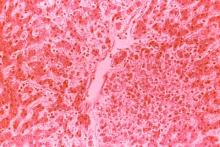A newly developed vaccine, known as TV003, has been shown to induce complete protection against dengue fever in a human challenge model, making it the first-ever such vaccine for the world’s most common mosquito-borne viral disease.
“Control of dengue has certainly been a public health priority for [about a century], but getting there hasn’t really been very easy,” explained Stephen S. Whitehead, Ph.D., of the National Institute of Allergy and Infectious Diseases during a March 15 teleconference held by the American Association for the Advancement of Science. “Dengue virus comes in four different types, or varieties, and a useful vaccine really needs to protect against all four of them at the same time.”
The TV003 vaccine tested in the trial comprised the dengue virus type 1 (DEN1)delta30, DEN2/4delta30, DEN3-3delta30/31-7164, and DEN4delta30 strains. Initially, Dr. Whitehead and his team planned to use rDEN2delta30 as the component for protecting against type 2 dengue virus strains, but “it was not sufficiently attenuated in preclinical studies when compared with its parent virus.” Therefore, it was chosen as the challenge virus to test the protective efficacy of TV003.
Dr. Whitehead and his coinvestigators evaluated 118 individuals for inclusion in the human challenge trial, seeking flavivirus-naive subjects from centers in Burlington, Vt., and Baltimore during November 2013–February 2014. Eventually, 48 subjects were enrolled and randomly assigned to receive the TV003 vaccine or placebo.
After 6 months, subjects were injected with rDEN2delta30, a recombinant strain of dengue virus, to determine the viability of TV003. Of the 48 participants, 41 returned for follow-up: 21 in the TV003 group and 20 in the placebo cohort.
None of the 21 subjects in the TV003 group developed any dengue virus infection after exposure to rDEN2delta30, meaning the candidate vaccine was 100% effective. However, in the placebo group, 100% of the 20 subjects developed viremia, 95% had rDEN2delta30 recovered from blood samples on multiple days, 80% developed a rash consistent with dengue virus infection, and 20% developed neutropenia. Subjects in the TV003 cohort reported an adverse event of a “mild, asymptomatic rash” in 79% of cases.
“The strong protective immunity against DENV-2 induced by TV003 is likely a combination of both a strong homotypic antibody response against DENV-2 that can prevent infection in most of the subjects and a cellular immune response that controls infection if it does occur,” Dr. Whitehead wrote (Sci Transl Med. 2016 Mar 16. doi: 10.1126/scitranslmed.aaf1517). “Under investigation are the roles of both in the protective immune response to dengue to better define a correlate of vaccine efficacy.”
There were no statistical differences between the vaccine and placebo groups in age (29 and 31 years, respectively) sex (54% and 67% male), or race (58% and 63% white).
The study was funded by the National Institutes of Allergy and Infectious Diseases Intramural Research Program. Dr. Whitehead disclosed that he is an inventor of three patents related to components of a dengue virus vaccine. No other authors reported any relevant financial disclosures.


